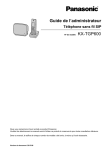Download Bria BlackBerry Edition User Guide 1.1.0
Transcript
Bria BlackBerry Edition User Guide CounterPath Corporation CounterPath Corporation Suite 300, One Bentall Centre 505 Burrard Street, Box 95 Vancouver, BC V7X 1M3 Tel: 604.320.3344 [email protected] www.counterpath.com © September 2013 CounterPath Corporation. All rights reserved. This document contains information proprietary to CounterPath Corporation, and shall not be used for engineering, design, procurement, or manufacture, in whole or in part, without the consent of CounterPath Corporation. The content of this publication is intended to demonstrate typical uses and capabilities of the Bria BlackBerry Edition application from CounterPath Corporation. CounterPath makes no warranty regarding the content of this document, including—but not limited to—implied warranties of fitness for any particular purpose. In no case will CounterPath, its employees, officers or directors be liable for any incidental, indirect or otherwise consequential damage or loss that may result after the use of this publication. CounterPath and the logo are trademarks of CounterPath Corporation. This manual corresponds to Bria BlackBerry Edition version 1.1.0. BlackBerry® and related trademarks, names and logos are the property of Research In Motion Limited and are registered and/or used in the U.S. and countries around the world. Used under license from Research In Motion Limited. Rev 2 Bria BlackBerry Edition User Guide Contents About Bria BlackBerry Edition.....................................................................................................1 Configuring ...................................................................................................................................3 Getting Ready .........................................................................................................................3 Setting up Bria ........................................................................................................................4 Working with Contacts ...........................................................................................................5 Making Phone Calls......................................................................................................................7 Starting and Quitting Bria.......................................................................................................7 Interaction between Bria and Native Phone ...........................................................................8 Placing a Call ..........................................................................................................................9 Handling Incoming Calls ........................................................................................................10 Handling One Established Call...............................................................................................12 Placing a Second Bria Call .....................................................................................................13 Handling Two Established Calls.............................................................................................14 Unattended (Blind) Transfer ...................................................................................................15 Attended Transfer ...................................................................................................................17 Conference Call ......................................................................................................................18 Call History.............................................................................................................................19 Accessing Voicemail ..............................................................................................................21 Settings..........................................................................................................................................23 Accounts .................................................................................................................................24 Preferences..............................................................................................................................27 Advanced Settings ..................................................................................................................28 Premium Features ...................................................................................................................31 A Troubleshooting ........................................................................................................................33 B Dial Plans ..................................................................................................................................35 C Glossary.....................................................................................................................................37 i CounterPath Corporation ii Bria BlackBerry Edition User Guide 1 About Bria BlackBerry Edition Bria BlackBerry Edition is a SIP-based phone for the Blackberry® Z10 device. With Bria BlackBerry Edition (Bria), you can use the Wi-Fi connection or the mobile data connection to make and receive calls. Standard Telephone Features Bria BlackBerry Edition has all the standard telephone features, including: • • • • • • • • Call display and Voicemail Indicator. Speakerphone, Mute, and Hold. Call history – list of received, missed, and dialed calls. Call transfer. Three-way audio conference. Audio codecs G.711, G.722, GSM, and iLBC, with an option to purchase G.729. Ringtones and contact avatars. Support for DTMF: the ability to enter numbers to use with an auto attendant. Advanced Features • • • • • NAT traversal (STUN and ICE). Secure call signaling (TLS). Audio encryption (SRTP). DNS SRV record lookups. Application diagnostics (logging and log files uploading). Accessories The following accessories are supported: • • Headset with microphone: Bria BlackBerry Edition uses the ear-piece and microphone on the headset. Headphones (no microphone): Bria BlackBerry Edition uses the ear-piece on the headphone and the built-in microphone on the device. 1 CounterPath Corporation 2 Bria BlackBerry Edition User Guide 2 Configuring 2.1 Getting Ready 1. Once you have installed Bria BlackBerry Edition, make sure you have set up Wi-Fi and mobile data correctly on your device. Go to System Settings > Network Connections, then do the following: • • Set up Wi-Fi: tap Wi-Fi, then enable the Wi-Fi field. The panel will be populated with access points. Tap to choose an access point and wait for the item to show Connected. Set up mobile data: tap Mobile Network, and enable the Mobile Network field. 2. Obtain the following information from your VoIP service provider: • • • Your username, password and domain. Your auth name (authorization name), if used by your service provider. Your voicemail number, if your service provider provides this service. 3. Tap the Bria icon on the BlackBerry device. Bria launches. 3 CounterPath Corporation 2.2 Setting up Bria To use Bria as a phone, you need to create a SIP account with the information provided by your VoIP service provider. Tap the Settings tab then Accounts. Complete the User Details section and Voice Mail section (optional) with the information provided by your service provider. Tap Back. The account is created. Turn on the account to register. When you have successfully registered, tap the Phone tab and try placing a call. 4 Bria BlackBerry Edition User Guide Setting up Multiple Accounts You can set up more than one account if you have service from more than one VoIP service provider. You can set a primary account which will be used for outgoing calls as well as the voicemail icon on dialpad. Tap Account status Set up the account in the usual way Tap Back The green checkmark indicates a primary account. Enable the account 5 CounterPath Corporation 2.3 Working with Contacts Bria uses contacts saved on your device. Bria’s contacts are continually synchronized with your native contacts; adding, modifying or deleting a contact from one list update the other list. On Blackberry 10, you can set up multiple sources for contacts (for example, Email, Twitter, Facebook) and merge all into the native contact app. If you do this, you can access all contacts on Bria as well. 6 Bria BlackBerry Edition User Guide 3 Making Phone Calls 3.1 Starting and Quitting Bria Start Bria. The following screen appears. Bria is ready. The Navigation bar displays a message when your action is required. Not Registered: The SIP account is not registered. Make sure the account is turned on under Settings > Accounts. Mobile Use Disabled: You did not allow Bria to use mobile data (3G/4G/LTE) and you do not have a Wi-Fi connection. Use of mobile data is optional; to turn it on, go to Settings > Preferences. No Network: The device has no data connection whether it’s Wi-Fi or mobile data. Move to a different location. Quitting Once launched, Bria runs in the background. To quit Bria, go to the device’s home screen, then you will see the active frame of Bria. Tap on X on the bottom right corner of Bria. Tap to quit Bria. 7 CounterPath Corporation 3.2 Interaction between Bria and Native Phone Placing Calls • • You can place a Bria call so long as you are not already on two Bria calls. You can place a native call regardless of the state of Bria. Incoming Calls • • An incoming Bria call rings on your phone unless you are already on two Bria calls. In this case, the new incoming call will go to Bria voicemail instead. Incoming native calls: Being on a Bria call has no impact on your native phone: native calls will be received in the usual way. Therefore, you should be prepared to accept or decline a native call. Established Calls • • 8 This version of Bria is not able to recognize/detect native calls. When you answer or place a native call during a Bria call, the Bria call does not go on hold automatically; you need to put it on hold. You can have up to two Bria calls established at the same time and switch between them. Bria BlackBerry Edition User Guide 3.3 Placing a Call Using the Dialpad Enter the phone number To enter alphabets, tap this area then the keyboard appears along with the x mark which clears the entire entry. Tap Backspace From the BlackBerry device Contact List Tap the Contacts tab at the bottom of the screen If phone numbers from your contact list need to be modified (for example, to remove extra characters such as +), you can set up a dial plan. See page 35. Search for a contact or choose one from the list Tap the desired phone number Tap Call 9 CounterPath Corporation Making a Call from another Account If you have more than one account enabled, you can change the account to use on a given phone call. The current account To select the account, tap The new selection Tap the account you want to use 10 Bria BlackBerry Edition User Guide 3.4 Handling Incoming Calls When Bria Is in the Foreground Tap Decline or Answer 11 CounterPath Corporation When Bria Is in the Background When Bria receives a call in the background, the device will ring/vibrate/turn on LED indicator depending on the preferences within Bria. Bria does not use OS Notification settings except for LED. Make sure you turn on the Preferences within Bria for: Play Ringtone, Vibrate, and Alert Missed. The device rings/vibrates for incoming call. If the device is locked, swipe up to unlock. The prompt appears. Either answer or decline the call. If you answer, the call starts immediately; however you will not see in-call screen because Bria is not allowed to come foreground automatically. Swipe up and go back to Home screen, and then open Bria. 12 Bria BlackBerry Edition User Guide 3.5 Handling One Established Call Bria Call Mute or unmute Turn on/off Speakerphone. Tap to show a keypad in order to enter numbers, for example, when choosing menu items such as “enter 1 for customer support” Basic Transfer (transfer the current call without first talking to the target) Place a second phone call, or perform Attended Transfer Hold or release hold Native Call and Bria Call The Bria in-call screen does not show any indication that the native call is in progress. To switch between native call and Bria call, swipe up to go to Home screen, and tap either native dialer or Bria to bring foreward. You might want to put the current call on hold before switching. Put the call on hold if desired. Swipe up to go to Home screen. Tap native dialer to switch to the native call. Now you are in the native call. 13 CounterPath Corporation 3.6 Placing a Second Bria Call Using the Dialpad Or tap here to go back to the first call Place the call on hold, if desired Tap Add Dial the number of the second person and tap Call When the call connects, the first call is put on hold. You are now speaking to the second person. To switch to the other person, tap Swap. From the BlackBerry device Contact List Or tap here to go back to the first call Place the call on hold, if desired Tap Add Tap Contacts Search for the person and tap the phone number Tap Call When the call connects, the first call is put on hold. You are now speaking to the second person. To switch to the other person, tap Swap Calls 14 Bria BlackBerry Edition User Guide 3.7 Handling Two Established Calls Handling Two Bria Calls To switch to the other person, tap Swap Calls 15 CounterPath Corporation 3.8 Unattended (Blind) Transfer You can transfer the current Bria call to a second person without first talking to that second person. Using the Dialpad Tap Transfer Type the number to transfer to Tap The call ends on your side when answered by the target or picked up by the voicemail. By Selecting a Contact Tap Transfer The call ends on your side when answered by the target or picked up by the voicemail. Tap Contacts Tap the contact. Tap the phone number Tap Transfer 16 Bria BlackBerry Edition User Guide Blind transfer can be performed even when you have two ongoing Bria calls. You can transfer the active call to a third party (not the person on hold). When transferring the call, you won’t be able to speak to the person you are transferring to. Blind Transfer - Two Ongoing Calls Make sure the active call is the one you want to transfer to a third party. Tap Transfer When the call is answered by the target or picked up by the voicemail, the current call ends and the other call becomes active on your side. Tap No Type the number to transfer to Tap to transfer 17 CounterPath Corporation 3.9 Attended Transfer You can speak to the second person first then transfer the first person to them. You know there are two calls established because the Swap Calls button is showing. Establish two calls (page 14) When ready, tap Transfer. Tap Yes. The live call is transferred to the on-hold call. 18 Both calls end on your side when the call is transferred. Bria BlackBerry Edition User Guide 3.10 Conference Call When you have two Bria calls established, you can merge the calls into a three-way conference call. Establish two calls (page 14) You know there are two calls established because the Swap Calls button is showing. Tap Merge If desired you can split the conference back into two calls The two calls are merged into a conference Tapping End Call ends the conference and hangs up on both calls 19 CounterPath Corporation 3.11 Call History Tap the History icon at the bottom of the screen. Missed calls Tap to filter, as desired Incoming calls Outgoing calls The SIP account used for the call Clearing the History Tap to clear the current view. For example, clear only outgoing calls The colored number indicates the number used for the call. Tap to see detail Tap Tap to delete all outgoing calls. Tap to delete only the one selected. 20 Bria BlackBerry Edition User Guide Creating a Contact from History You can create a contact from a history item. Tap the arrow icon Tap New Contact or Existing Contact. If you tap New Contact, the New Contact screen appears with the number already entered. Complete the other fields. Or if you tap Existing Contact, the contact list appears. Tap the contact where you want to add this number. The contact is immediately updated. 21 CounterPath Corporation 3.12 Accessing Voicemail If your VoIP service provider provides a voicemail service, then incoming calls go to voicemail if: • • Bria is not running. You already have two calls established . The voicemail indicator on the Bria screen Tap the voicemail icon; the voicemail number appears in the entry field. Place the call in the regular way. (If no number appears, you have not set it up in settings; see page 24.) 22 The active frame shows a badge when the app is in the background. Tap @ on the Phone tab to see the counter for each account. Bria BlackBerry Edition User Guide 4 Settings Swipe down from the top of the screen to access Help and About page. 23 CounterPath Corporation 4.1 Accounts All the fields on this screen must be supplied by your VoIP service provider. SIP Accounts Top Half of Screen Bottom Half of Screen Field Description Account Name Change the name as desired. For example, “business account” Display as Your name. This will be your Caller ID if supported. User Name Typically the account number for the account. Provided by your VoIP service provider. Do not enter a domain name here. Password Provided by your VoIP service provider. Domain Provided by your VoIP service provider. VM Number The number to dial to connect to voicemail and check messages. Provided by your VoIP service provider. If there is a number in this field, tapping the VM icon on the keypad will display the voicemail number; see page 22. Dial Plan Optional. See page 35. Account Advanced See below. 24 Bria BlackBerry Edition User Guide Account Advanced (SIP) Top of Screen Middle of Screen Bottom of the Screen Field Description Out. Proxy If your VoIP service provider has an outbound proxy and requires that you provide that address to Bria, enter the domain name or the IP address obtained from your provider. Auth Name May not be required. But if it is required, it will be provided by your VoIP service provider. Send DTMF using The method used for DTMF, sent when you press a number key when dealing with an auto attendant (such as “press 1 for customer service”). RFC 2833, SIP INFO and Inband DTMF are supported. Suppress STUN Wi-Fi Allows you to control the use of STUN per account. Choose a method specified by your VoIP service provider. • ON: No STUN is used on this particular account. This setting overwrites the STUN Wi-Fi setting under Advanced Settings (which applies to all accounts); when Suppress STUN Wi-Fi is ON, no STUN is used on this particular account even if STUN is enabled under Advanced Settings. • OFF (default): Bria decides whether to use STUN or not depending on the STUN Wi-Fi setting under Advanced Settings. Suppress STUN Mobile This setting has the same function as Suppress STUN Wi-Fi, but applies only when you are connected over the mobile network. Use ICE Wi-Fi ICE is involved only in media routing (it is not involved in SIP signaling). ON: Bria will use ICE to discover addresses for media packets. ICE provides a good guarantee of two-way audio. However, to use ICE successfully, both endpoints in a call must use ICE and specifically must use draft 19 of the ICE standard. OFF: Try turning ICE off if you are not using BlackBerry device behind a firewall or NAT. Use ICE Mobile This setting has the same function as ICE Wi-Fi, but applies only when you are connected over the mobile network. 25 CounterPath Corporation Field Description Global IP Wi-Fi • ON (default): Bria will publish its public IP address at the signaling level. The public address may not work with some NATs or firewalls. • OFF: Bria will publish its private IP address at the signaling level. "Off" represents server-based network traversal, "On" app-based. Global IP Mobile This setting has the same functionality as Global IP Wi-Fi, but applies only when you are connected over the mobile network. Use Tel URI Change this value only if advised to do so by your VoIP service provider. • ON: Prefix SIP URIs with tel:// • OFF (default): Prefix SIP URIs with sip:// SIP Transport Tap to display the choices. Contact your VoIP service provider to identify the types of transport that are supported. • UDP and TCP do not support signal encryption. • TLS does support signal encryption. If TLS is selected, a given call will be encrypted if the other person also uses TLS. You may also need to install a certificate on your BlackBerry device; speak to your VoIP service provider. Encrypt Audio If the transport is set to TLS, you can encrypt a phone call at the media (audio) level: • Never: Audio is not encrypted. • If Possible: On a given call, audio will be encrypted if the other person supports and is also using audio encryption. If not, audio will not be encrypted. • Always: Audio will always be encrypted. The call will fail if the other person cannot accept encrypted calls. Wi-Fi Refresh Interval The timer interval between Bria’s attempts to register in order to refresh the account registration over Wi-Fi network. This value is placed in the “Expires” header field of the SIP REGISTER message. Change this value only if advised to do so by your VoIP service provider. Mobile Refresh Interval Same as above, except the interval applies to registration made over the mobile data network. Keep Alive - Wi-Fi Interval A “keep alive” message is a mechanism for maintaining a “pinhole” through your firewall so that the account registration is maintained. The interval specifies how often the message is sent (in seconds). If you are experiencing problems (for example, accounts become unregistered when using a WiFi connection), try setting this interval to a lower number such as 20. Keep Alive - Mobile Interval Same as above, except the interval applies to registrations made over the mobile data network, which can be made on an BlackBerry device when you are not in a Wi-Fi zone. Single Register Applies only if Global IP is ON. • ON (default): Bria will register using a single register request. • OFF: Bria will register using an unregister and a register. Passive Session Timer Controls the use of session timers on SIP accounts. The session timer is used to determine if the call is still active. Only choose Off if advised by your VoIP service provider. • ON (default): Bria will not use session timers in any session, except it is explicitly required by the remote party. • OFF: Bria will use session timers in all sessions whenever the remote party supports and uses it. Connection Reuse • ON: Bria uses existing connections by including an “ob“ parameter in a header as defined in RFC5626. • OFF: Bria does not reuse existing connections. Changing this setting might solve problems with dropping or holding calls. The default is On. Enable IMS 26 When ON, Bria supports the IP Multimedia Subsystem. The default is Off. Subject to VoIP service provider. Only choose ON if advised by your VoIP service provider. Bria BlackBerry Edition User Guide 4.2 Preferences Top of the Screen Bottom of the Screen Field Description Use When Available • ON: When a Wi-Fi connection is not available, Bria will attempt to connect to SIP service using the mobile data network. Data charges with your mobile carrier will apply. You will be able to make and receive calls. • OFF: When a Wi-Fi connection is not available, the SIP account will be unregistered; you will not be able to place or receive calls. Play Ringtone ON to hear the ringtone. Vibrate ON to vibrate when you receive a call. Alert Missed Controls the behavior of the missed call prompt (when you receive a call when Bria is in the background): • ON: A Missed Call alert appears on the native BlackBerry device screen. • OFF: No alert appears. Ringtone The ringtone for incoming calls. Contact Image ON to display the image of your contact while receiving or making calls. Forward Calls ON to send all incoming calls to a specific number. So long as Bria is registered, incoming calls will be forwarded to this phone number. To Number The number to forward calls to, when Forward Calls is ON. 27 CounterPath Corporation 4.3 Advanced Settings Top of Screen Middle of Screen Bottom of Screen Field Description Network Traversal Strategy Tap to display the choices; see below. RTP Port Start Change this value only if advised to do so by your VoIP service provider. This indicates the start of the ports range used for RTP and RTCP sessions. The range is 100 ports wide. The range is not observed if ICE is used. The default is 4000. Audio Codecs Selection Tap to display more information about these two fields. See page 30. Verify TLS Cert Applies only if you use TLS as the transport. • On (default): Bria attempts to verify the certificate, sent by the SIP server, to see if it is trusted. For the certificate to be trusted, a corresponding CA certificate, provided by your VoIP provider, must be installed on your device. • Off: Bria accepts the certificate without attempting to verify it. Enable RPort • On: the outgoing INVITE message will have an RPort parameter inside the Via header, which indicates that Bria supports RFC 3581. If the server also supports RFC 3581, the server should respond with the RPort parameter set to the incoming public IP port and the received parameter set to the public IP address. This is the default behavior in previous Bria versions. • Off: Bria does not have the RPort parameter in the Via header. Enable PRACK • On: Bria advertises that it supports “100rel” and allows PRACK, as defined in RFC 3262. The outgoing INVITE message will have “100rel” in the Supported header and “PRACK” in the Allow header. This is the default behavior in previous Bria versions. • Off: Bria will not advertise these features; there will be no “100rel” in the Supported header. Encode # in URI • On (default): Bria escapes a hash character (#) used in the user part of SIP URI, as required by RFC 3261. • Off: Bria does not escape a hash character and sends it as is. Turn this setting off if you are having trouble making outgoing calls to a number with a hash character. Verbose Logging Leave this setting OFF unless customer support instructs you to turn it ON in order to troubleshoot a problem you are having on your device. See page 33. Send Log Tap to upload the current log to customer support. See page 33. 28 Bria BlackBerry Edition User Guide Network Traversal Strategy Select a profile: • Application Managed: STUN Wi-Fi ON, STUN Mobile OFF, and DNS SRV ON. Bria will use the specified STUN server to discover the public address of your device. It will present your public address for SIP signaling. When negotiating media routing, it will present either both your public and private addresses or just your public address depending on the ICE settings under Account Advanced . • Server Managed: STUN OFF and DNS SRV ON. Bria will present your device’s private address for SIP signaling and when negotiating media routing. Choose this option if your VoIP service provider advises you that it has implemented a network-hosted NAT traversal (or farend NAT traversal) technology such as a session border controller (SBC), media proxy or RTP relay. • Custom Configuration: Set the settings as desired. Field Description DNS SRV • ON: Bria will use DNS SRV to discover the network addresses for your VoIP service provider's VoIP-related services such as a STUN server, if any. • OFF: Bria will not use DNS SRV for discovery. Only turn this setting off if your system administrator advises you to do so. STUN Server Used only if STUN is ON. The default is stun.counterpath.com but we recommend that you change this to an address provided by your VoIP service provider. CounterPath cannot guarantee the availability of their STUN server. STUN Wi-Fi • ON: Bria will use a STUN server to discover your public IP address. • OFF: Bria does not discover your public IP address. Therefore, only the private IP address will be used. Typically, Global IP should be set to OFF to assure that the private IP address is used for SIP signaling. STUN Mobile This setting has the same function as STUN Wi-Fi, but applies only when you are connected over the mobile network. 29 CounterPath Corporation Audio Codecs Selection You can only enable G729 if you have purchased them; see page 31. Select the codec and tap the up or down button to change its priority in the list. See below. Mobile Audio Codecs Wi-Fi Audio Codecs These two screens list the audio codecs that can be used during a Wi-Fi call or mobile data call. Codecs are programs in Bria involved in transmitting audio; each codec has different characteristics and therefore each works better in some situations than in others. In general, it is desirable to have several codecs enabled. Make sure that there are common codecs between you and the remote peer, otherwise your call will fail with a 488 error. Novice and Non-technical Users We recommend you use the default setting/priority and let Bria select the best codec to use in a given situation. Technically Savvy Users You may choose to enable one, some or all codecs. If only one codec is enabled, all calls will be made with that codec. If more than one is enabled, Bria negotiates the codec to use (from among the enabled codecs) with the other person. You can prioritize codecs by selecting it and tapping the up or down button in the list. Codecs higher in the list are given a higher priority in the offer, when negotiating codecs with the other party. Therefore, moving a codec higher should improve its chances of being chosen. G.722 is a wideband codec. All other codecs are narrowband. When a wideband codec is used, data usage will be higher and audio quality will generally be better. When a narrowband codec is used, data usage may be lower but audio quality may be affected. Data usage for the codecs, from high to low usage, is: G.722, G.711, iLBC, GSM, G.729a. 30 Bria BlackBerry Edition User Guide 4.4 Premium Features To purchase an item, tap the item. On the Product Detail screen, tap the price button to connect to BlackBerry World. A confirmation prompt appears. Tap Cancel or Buy. G.729a Audio Codec G.729a is a narrowband codec that is intended for low bandwidth use. It is particularly recommended if you will be making calls over mobile data network (3G/4G/LTE) because it provides better audio quality on your mobile data connection. 31 CounterPath Corporation 32 Bria BlackBerry Edition User Guide A Troubleshooting Using Bria Diagnostics The log file is sent to customer support. Tap OK Tap Send Log Tap Send A reference number. If you have a problem with Bria, customer support may ask you to turn on diagnostics to capture information. 1. Go to Settings > Advanced Settings. 2. Scroll down to the bottom. If Verbose Logging is OFF, turn it to ON. 3. Reproduce the problem. 4. When done, go to Settings > Advanced Settings again. Tap Send Log. A prompt appears. Tapping Send will send the log to the server. Once the file has been sent, you will see a notification; this notification includes a reference number. 5. Contact customer support at http://support.counterpath.com with the details of your issue and the reference number. The description of the problem could include the following: • • • • What you were doing when the problem occurred. Your BlackBerry device and model. Any recent changes you have made to your setup of Bria. Whether you are in your “home” Wi-Fi zone (your normal Wi-Fi zone) or a different Wi-Fi zone. 6. When done, turn off Verbose Logging. 33 CounterPath Corporation More Information You can view Frequently Asked Questions at https://support.counterpath.com/knowledge-base/bria-blackberryedition. 34 Bria BlackBerry Edition User Guide B Dial Plans You can create a dial plan in order to modify a phone number used in a phone call (the “input”), in order to ensure the call is placed successfully. For example, you could create dial plan to change any number that starts with “+1613” to just “613”. Setting up Dial Plans You can create as many dial plans for an account as you need. A dial plan belongs only to one account. Bria goes through the dial plans in the order in which they appear on the screen. You can drag dial plans to change their order. Go to Settings > Accounts > tap the account. Scroll down. The dial plan is added to the list. Tap Tap Complete the fields as required; see below. Tap to save To change or delete the existing plan, select the plan and tap the Menu button; you will see Edit and Delete. 35 CounterPath Corporation Designing the Dial Plan A dial plan has two parts: • • A pattern that the phone number (the input) must match. The modification to make if the input matches that pattern: removing a prefix, adding a prefix, or removing one prefix and adding another one. Subsequence substitution is also supported. Example 1 Match number: +1613x. Remove Prefix: +1613 Add Prefix: 9 If the input starts with “+1613”, then remove the “+1613” then add “9” and dial the number. So +16135550012 is dialed as 95550012. Example 2 Match number: [2-9]xxxxxxxxx Add Prefix: 1 If the input is a 10-digit number starting with a number other than 1, then add “1” and dial the number. So 6045550012 is dialed as 16045550012. The Pattern The pattern can be made up of any combination of the following: Element Description 0 to 9 Any digit x A single wildcard *#+ These symbols [] A collection that can include range. For example [6-9] means 6 7 8 9. Or [136-9] means 1 3 6 7 8 9. . Repeat the last element 0 or more times. For example, with the pattern “12.” the following input will match: 1 (The “2” is repeated zero times) 12 122 1222 and so on The Modification The modification can add or remove characters, and can be made up of digits, wildcards or symbols. 36 Bria BlackBerry Edition User Guide Advanced Dial Plan: Subsequence Substitution The match pattern can include a sequence of numbers to match and another sequence to substitute for the match. This feature is useful if you want to convert a sequence within the input, not just add or remove a prefix. The syntax is: <input sequence : substitute sequence> For example: <604:250> means change the sequence “604” to “250”. The sequence substitution element can be combined with any other elements in the match pattern. For example: +x.<604:250>x. would change match +6045551212 and +16135556040 and in both cases change the “604” to “250”. 37 CounterPath Corporation 38 Bria BlackBerry Edition User Guide C Glossary Bria call Codec DTMF ICE IP address IVR Media Native call Native phone service PSTN Signaling SIP SIP account softphone address STUN Wi-Fi call 3G/4G call A call made using the Bria screen. Compare to “native call”. Codecs are programs in Bria involved in transmitting audio; each codec has different characteristics and therefore each works better in some situations than in others. Dual-tone multi frequency. DTMF is the system that is used in interactive voiceresponse menu systems such as the menu system for accessing voicemail messages. The DTMF system allows the user to interact with the menu by pressing keys on a dialpad or keyboard. Interactive Connectivity Establishment. A method for traversing a firewall. A unique number that identifies a device. Devices on a network use the IP address to communicate with each other. Interactive Voice Response. IVRs use DTMF. The audio portion of a call. Compare to “Signaling”. A call made using the phone service that comes with the BlackBerry device. The phone service that comes with the BlackBerry device. Public Switch Telephone Network. The traditional land-line phone network. The information in a call that deals with establishing and controlling the connection, and managing the network. The non-signaling portion of the call is the Media. Session Initiation Protocol. The signaling protocol followed by Bria for handling phone calls. An account that provides the user the ability to make VoIP phone calls. The account encapsulates the rules and functions the user can access. The address used to connect to a SIP endpoint. In other words, the “phone number” used in a VoIP phone call. For example, sip:[email protected]. Simple Traversal of UDP through a firewall or NAT. A Bria call made over the Wi-Fi internet. To make a Wi-Fi call, you must be in a WiFi zone. A Bria call that uses the mobile data network rather than the Wi-Fi network. If you start (or receive) a call with an BlackBerry device when you are not in a Wi-Fi zone, the call will be a 3G/4G call. 39 CounterPath Corporation 40






















































